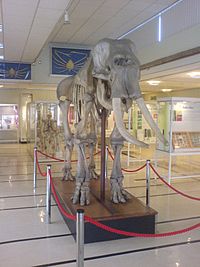Cole Museum of Zoology facts for kids

The skeleton of the circus elephant that dominates the main floor of the museum
|
|
| Lua error in Module:Location_map at line 420: attempt to index field 'wikibase' (a nil value). | |
| Established | Early 20th century |
|---|---|
| Location | Reading, Berkshire, UK |
| Type | University museum |
| Collections | Zoology |
The Cole Museum of Zoology is an amazing museum at the University of Reading in England. It is part of the university's School of Biological Sciences. You can find it on the ground floor of the Health and Life Sciences building. This building is on the university's Whiteknights Campus in the town of Reading, Berkshire. The museum's collection started way back in 1907.
Contents
History of the Museum
How the Collection Started
The museum's collection began in the early 1900s. A Professor of Zoology named Francis J. Cole started it. He worked with Dr Nellie B. Eales, who helped organize everything. Mr Stoneman also played a part in setting up the collection. They gathered all the specimens between 1907 and 1939. Professor Cole retired in 1939.
Moving to New Homes
When Professor Cole passed away in 1959, the University bought his huge collection of books. These books are now a special part of the main library. The museum was first located at the University's London Road Campus. In the 1970s, it moved to the Whiteknights Campus. Then, in 2021, the museum moved again. It found a new home in the Health and Life Sciences building. This building is still on the Whiteknights Campus.
What You Can See
Amazing Animal Specimens
The Cole Museum of Zoology has about 4,000 different animal specimens. At any time, about 400 of these are on display for visitors. The specimens are arranged in 14 display cases. They are organized by taxonomic sequence. This means you can take a tour and see the incredible variety of the animal kingdom.
Highlights of the Collection
Some of the most exciting things you can see include:
- A full skeleton of a male Indian circus elephant. It's huge and stands out on the main floor.
- A 5-meter long reticulated python skeleton. This snake skeleton has an amazing 400 bones in its spine!
- A fossil of the biggest spider that ever lived. Imagine how big that spider must have been!
- The skeleton of a false killer whale. This is a type of dolphin, not a true whale.
Virtual Museum and Caretakers
If you can't visit in person, you can explore the museum's collection online. It's like a virtual museum! Staff members from the University's School of Biological Sciences take care of all the collections. They make sure everything is well-preserved.
See also
- University of Reading
 | Madam C. J. Walker |
 | Janet Emerson Bashen |
 | Annie Turnbo Malone |
 | Maggie L. Walker |

